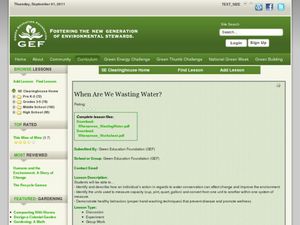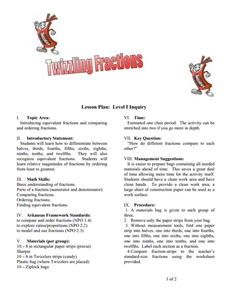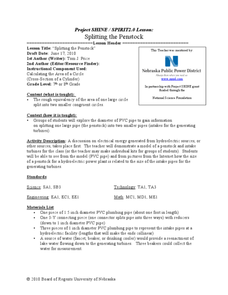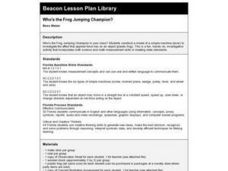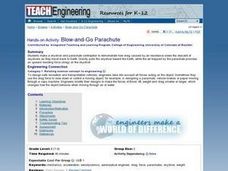Coastal Carolina University
Osmosis and Diffusion Lab: Honey I Blew Up the Bear
Beginning biologists explore passive transport through two demonstrations and a hands-on inquiry. Spray air freshener from one spot in the classroom and have class members raise their hands as the scent reaches them. Also, place a teabag...
Teach Engineering
Magnetic Fields Matter
Help your young scientists learn which materials are affected by magnetic fields with an activity that presents the information about different types of materials — diamagnetic, paramagnetic, and ferromagnetic — and their interaction...
Curated OER
Body Basics
Youngsters discuss the basics for appropriate bodily behavior in the classroom. This lesson addresses the importance of keeping one's hands to yourself, raising your hand when wanting to speak, and keeping your eyes on teacher when they...
Curated OER
Technical Writing Assignment
Students demonstrate, in writing, the proper technique to measure, square, and cut a piece of stock to length using a circular saw.
Curated OER
Look at Those Leaves!
Learners observe leaves in hands-on ways. As they observe attributes, they will group the leaves according to these attributes and consider any patterns they see emerge. In addition, they will communicate what they have learned about...
Curated OER
Graphs and Functions
Use this series of activities to introduce learners to graphing functions. They graph both linear and quadratic equations by hand and with a Graph Sketcher Tool. Several imbedded links and handouts are included in the lesson.
Curated OER
When Are We Wasting Water
Students study water conservation. In this water conservation lesson, students participate in a water conservation experiment. Students discover how to conserve water while washing their hands.
Curated OER
The Crash Scene
Fifth graders explore geography by participating in a mapping activity. In this engineering lesson, 5th graders identify the differences between latitude and longitude and practice locating precise points on a globe or map. Students...
Teach Engineering
Bone Density Challenge Introduction
Can you use X-rays to measure bone mineral density? This is the essential question that learners must answer in the first installment of a seven-part series. They brainstorm ideas about necessary background information and what they...
Curated OER
Interpreting and Displaying Sets of Data
Students explore the concept of interpreting data. In this interpreting data lesson, students make a line plot of themselves according to the number of cubes they can hold in their hand. Students create their own data to graph and...
University of Arkansas
Twizzling Fractions
Using food as a manipulative is one of the best ways to incorporate hands-on learning in the classroom. This hands-on approach allows young mathematicians to compare, order, and identify fractions with the use of Twizzlers® and...
Curated OER
Splitting the Penstock
Students investigate the best way to calculate the measurements of an area. In this geometry lesson, students relate a large circle to a cylinder and its measurements. They use PVC pipes to gain hands on experience as they calculate the...
Curated OER
Aerobic And Anaerobic Activity
Third graders engage in the study of aerobic and anaerobic activities. They discuss the differences in the type of exercises involved. Students identify the types of activities they enjoy based upon the information given. Then students...
Curated OER
Market Basics: Demand, Supply, and Price Determination
Students are introduced to the concepts of supply and demand. Using the Law of Demand and Supply, they develop charts and graphic models of supply and demand. They compare and contrast the behavior of consumers and suppliers when there...
Curated OER
I Can Use a Worm to Count
Kindergarteners use worms, puppets or other props to practice counting to 100. First, they listen to a read aloud of Count Worms by Roger Hargeaves. A worm pattern is used to count to 100, with each segment of the worm...
Curated OER
Louisville's Best Field Day Park
Students create a survey to hand out to determine the best field day park. Using their local area, they select five parks, if possible, that meet the criteria and calculate the distance and estimated time travel. They use this...
Curated OER
Who's the Frog Jumping Champion?
Students use a simple machine (a lever) to launch a plastic frog. students determine who is able to make their frog "jump" the farthest and graph the results.
Curated OER
A Unified China
Students examine the major changes Qin accomplished as emperor. They look at his steps to unify China, create a money standard, measurement standards, and a system of bureaucracy.
Curated OER
Can You Measure This?
Fifth graders design their own house, while also using problem-solving skills involving perimeter and area. They exchange houses with a partner and find the perimeter and area of the window, doors, and front side of the house.
Teach Engineering
An Introduction to Air Quality Research
Viewers are a PowerPoint are exposed to the idea that pollutants are in more than just the air we breathe. the presentation provides information about the layers of the earth's atmosphere and takes a look at the pollutants in the...
Teach Engineering
May the Force Be with You: Weight
Too much material will weigh you down. The sixth segment in a series of 22 highlights how weight affects a plane. Pupils learn that engineers take the properties of materials, including weight, when designing something.
Curated OER
Blow-and-Go Parachute
Students design a skydiver and parachute constraption to demonstrate how drag caused by air resistance slows the descent of skydivers as they travel back to Earth. They experience how gravity pulls the skydiver toward the earth and how...
Teach Engineering
Nanotechnology as a Whole
It's a small (nanotechnology) world after all! The first segment of a six-part series gives an overview of nanotechnology, its principles and applications, and shares some of the engineering applications of nanotechnology. A...
West Contra Costa Unified School District
Arcs and Angles
Noah didn't construct this kind of arc. High school scholars first explore how angles can be formed in circles. They then learn relationships between angles and arcs by conducting an exploratory activity where they position and draw arcs...






